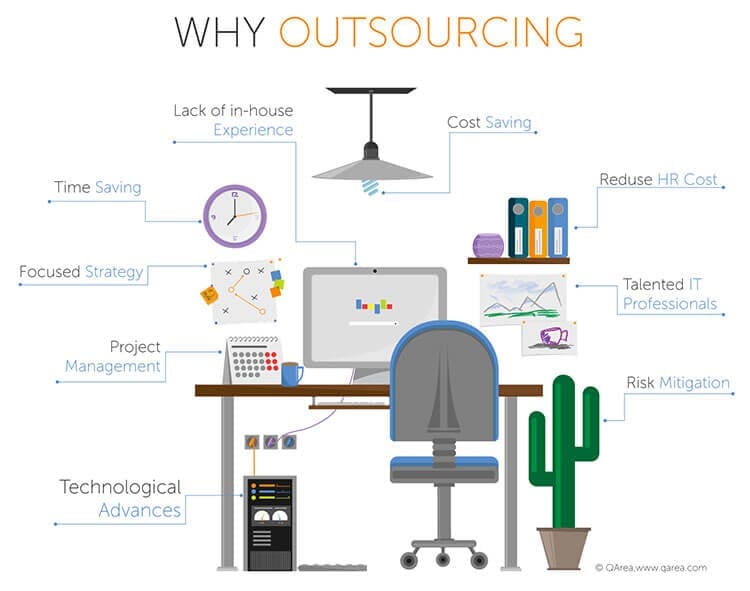Any modern business, regardless of the industry it operates in, is an intricate and complex system. CEOs and top-level managers need to perform a wide range of different functions to support this system, make it work, and continuously bring in revenue. Establishing a clear and effective control over business processes is also important. And the larger the company, the more difficult it is to carry out these functions. In some cases, a company can hire additional managers and split some areas of responsibility between them. Still, broadening the enterprise hierarchy is more often than not ineffective from at least managerial and budget perspectives. What should a business do when it finds itself standing at this crossroads?
In recent years, outsourcing has emerged as a go-to solution for such challenges, becoming a popular partnership mode among business owners and top managers. When a company uses outsourcing services, it transfers a project or operation to another organization. (Marketing — like social media campaign, PR, and new product launch activities — is one of the most common types of business activities a company outsources.)
Outsourcing is conducted on the basis of a contract, with common term being a year. This is the aspect that sets outsourcing apart from some other types of partnership, in which companies, for example, simply request a small piece of work to be done for them. Better stated, outsourcing is not a quick, one-time deal.
The reasons for why do companies outsource does not end there. It should be understood that this format of cooperation allows a company to increase its operational productivity and its business efficiency in general. After all, properly delegating a number of tasks to a reliable partner gives an organization the precious opportunity to focus on the implementation of strategic plans that demand ample time, effort, and focus — without constantly being distracted.
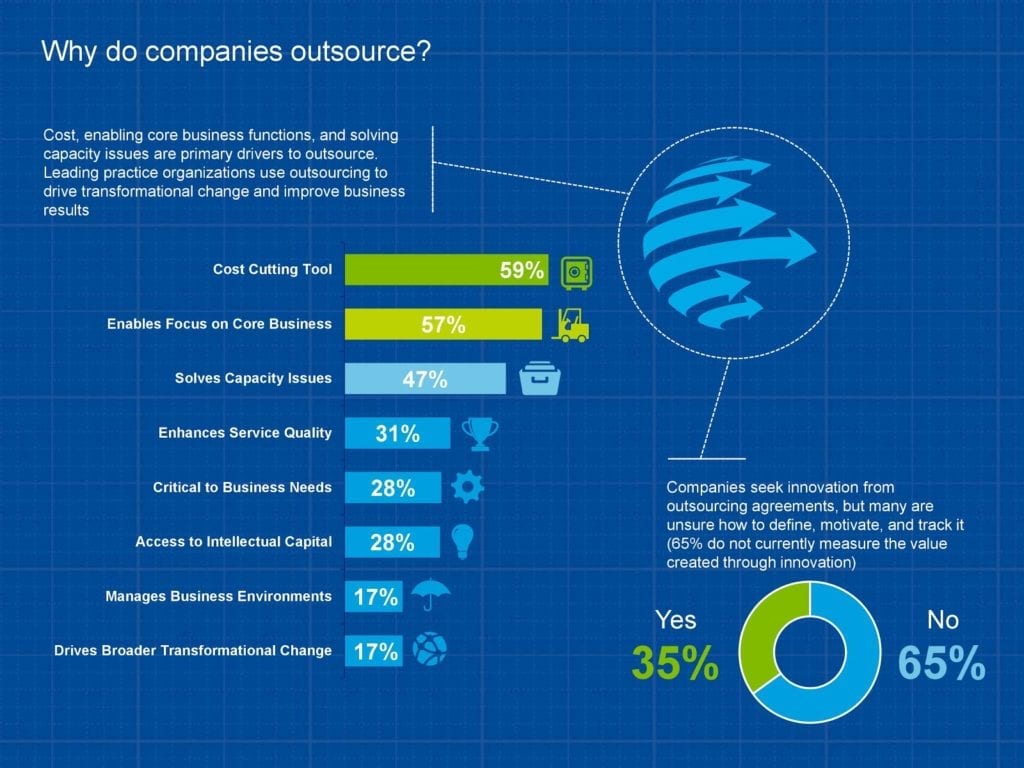
There are several important reasons why companies sometimes prefer to use outsourcing services:
- The organization has grown significantly in recent years and continues to evolve. Managing every operation efficiently becomes a big challenge, and spendings may also rise. As a result, a company entrust management of a particular process to a reliable partner organization.
- Many enterprises aim at delegating important operations to large organizations that focus on multiple, expecting to strike long-term partnerships. They seek reliability and time-proven expertise in multiple different fields at once. While this is understandable, and while everything sounds good on paper, such cooperation often becomes ineffective. Thus, outsourcing comes out as a reliable, more focused and effective replacement, which also often saves costs. After all, it is easier and more yielding in terms of time and budget to just hire different outsourcing partners for different operations.
- The company enters a new market and needs external expertise to make the first step. There is a need to hire more staff, which is also associated with extra costs and bigger time frames. Outsourcing provides a fitting solution here as well.
Outsourcing is also an effective means in business development, and the world’s largest companies have been using this mode of cooperation.
Why Do Companies Outsource To Other Countries?
There are situations when a company wants to enter an unknown or foreign market. In this case, they might be looking for a reliable partner abroad. This approach may result in cooperation with an organization that is recognized as an industry leader in the desired field in the country of interest.
So, why do companies outsource to other countries when they can probably hire specialists at home? There are several key reasons for that:
- The production of some items abroad often costs the company less than the full-fledged launch of the similar production line at home.
- This type of cooperation allows both companies to establish useful and valuable contacts, as well as get gain access to external markets and its resources.
- The use of such partnership mode makes it easier for the company to sell its products or services in other countries. After all, the closer it is to production, the lower the costs are.
A good example of this kind of a business format is Ford. The company produces only thirty percent of the necessary car components themselves. All other parts are produced using external resources provided by other companies.
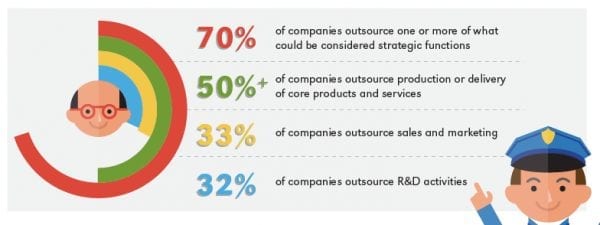
Here are the areas in which outsourcing is commonly used:
- Software development
- Accounting
- Production
- Data maintenance
- Inventory audit services
- Personnel management
- Logistics services

Software development leads the list when it comes to popular outsourcing areas. The question is why do companies outsource software development? There are three main reasons.
- Software development is undoubtedly a niche area. Building and maintaining a software development team is challenging regardless of the project in question. Needless to say, it is also expensive. And the majority of companies do not have IT departments. So, entrusting a software project to a partner with the right talent already in available becomes a more appealing option.
- Outsourcing a software project to a reliable partner allows a company to speed up the implementation of their project and reduce costs.
- Outsourcing a project to a partner, in most cases, includes continuous cooperation with them. As a result, that partner shares new, niche knowledge in the process of helping the hiring company with the project.
- As the role of software across industries continues to grow, so does the competition. Hiring the right software partner in time and building a software product faster than the competitors becomes increasingly important.
Outsourcing Software Development: Key Goals & Special Features
The world is constantly changing, and changing fast. Sometimes, consumer demands shift in a course of a single week. This pushes companies to change their strategies, and thus change their software products by adding new features, technologies, and minor details. Outsourcing software development helps to face these challenges.
How does it happen? It all starts with writing a contract that would include rights and obligations of each party — alongside the project details like features, delivery process, and other
Here are the common steps in the software outsourcing process:
- Working with user requirements and conducting business processes analysis
- Implementation of technical consulting, defining the main tasks of the project, and drawing up a project plan
- Outsourcing software development includes the development of a product concept and a prototype
- Design: user experience and interface design (UI and UX, respectively); customer experience design (CX)
- Development stage/coding
- Quality assurance/testing.
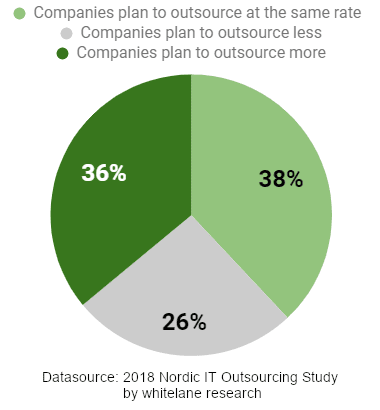
In addition, software development outsourcing involves conducting maintenance, but this question is usually raised only after the product is finished.
There is also a common software outsourcing development process for modernizing outdated legacy systems. Here are the stages:
- Conducting product testing and overview
- Updating of functionality
- Testing
- Release and performance monitoring
Сonsequently, software and IT outsourcing is aimed at developing software or improving an already existing product. In addition, it is possible to create applications and systems for various purposes, including:
- Enterprise resource management
- Digital document flow
- Software security solutions
- Customer relationship management
- Digital accounting
Such applications can also standalone products aimed at aimed at providing services and generating revenue. So, if you, for example, run a startup, outsourcing software development is also a viable option.
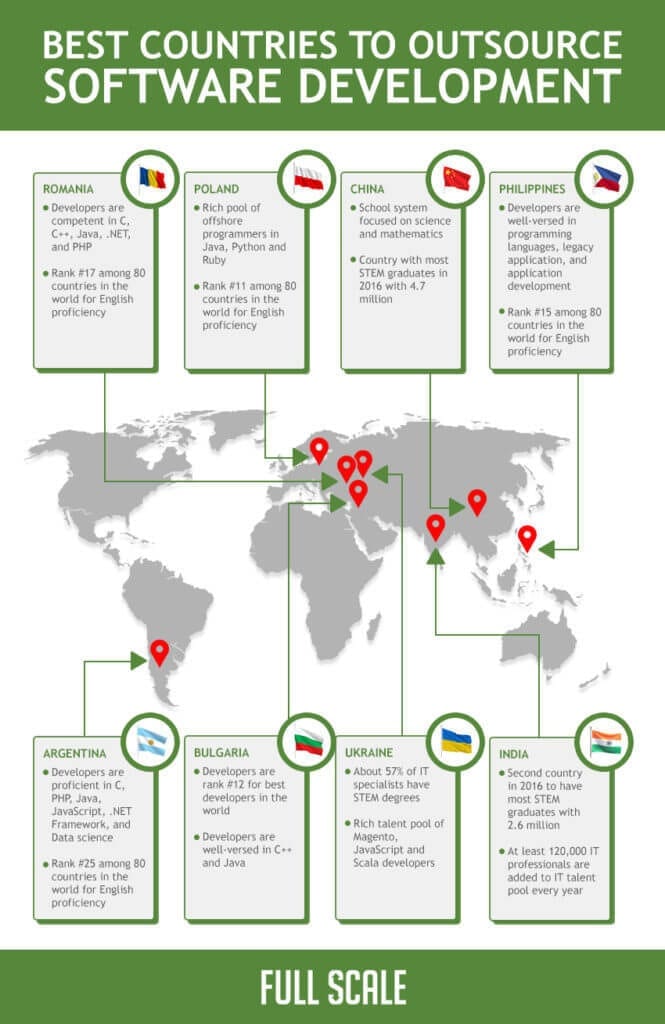
Finding the Right Software Outsourcing Company
Again, finding a reliable software outsourcing company is key. Still it is somewhat of a challenge — there are too many providers around the globe to choose from, and, as you might have guest, finding a good one takes time and effort.
When looking for software outsourcing companies, consider the following tips:
- Read reviews online and in the App Store and Google Play (if it is not an enterprise application)
- Look into the already finished projects — they speak volumes. No portfolio or a small number of projects is not a good sign regardless of how much you liked what the company is selling
- Make sure they have established a clear development process
- Order to write a comprehensive contract, especially if you are working with the chosen company for the first time
The tips might sound basic, but they are key to finding the right outsourcing software development companies. Still, there are more markers that can help you find a seasoned partner.
- Reliable outsourcing software development companies have extensive experience — least ten years.
- A trustworthy partner will select a team according to your project needs. This approach allows a software development outsourcing company deliver exactly the product you need.
- If you are building an innovative product that involves advanced technologies, your partner needs to have niche expertise in the technologies you need — or help you pinpoint the right tech for your project.
- A reliable software outsourcing company should offer comprehensive services — product and mobile app development, cloud and microservices, UI and UX design, and other.
- Seasoned software development outsourcing companies offer comprehensive post-release maintenance.
- Remember that reliable software outsourcing means that the development services will be delivered on time, according to your plan.
Outsourcing Software Development: Pros & Cons
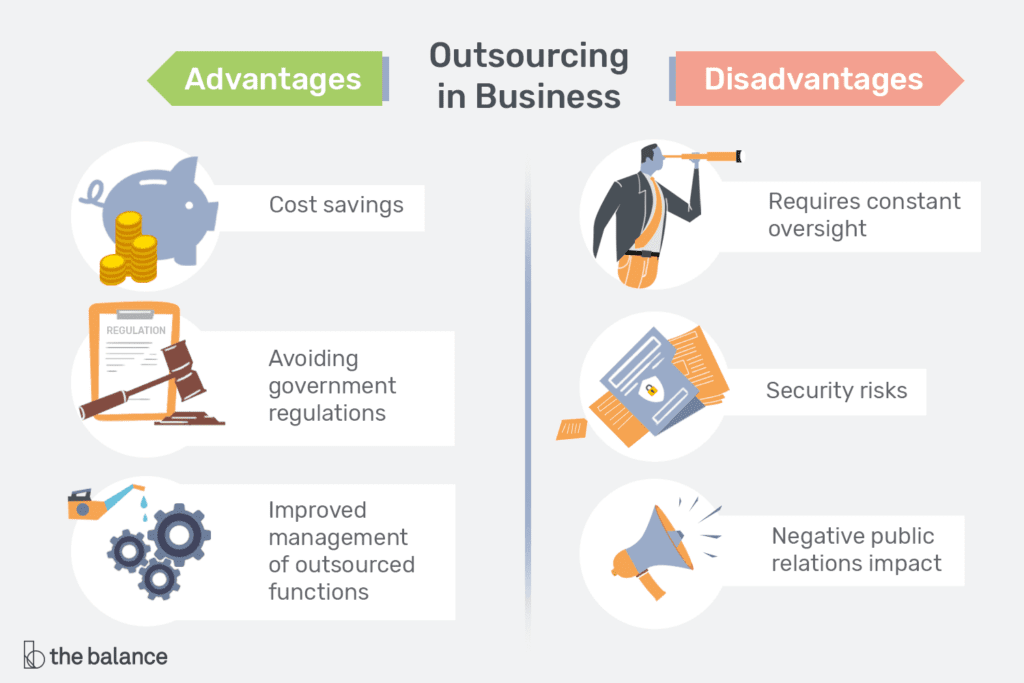
As any mode of cooperation, outsourcing has its advantages and disadvantages. Let’s start with the pros:
- Software outsourcing provides quick access to qualified professionals; companies will not have to waste time looking for new employees.
- If we consider the pros and cons of outsourcing software development, it is worth mentioning the main advantage: a company entrusts a task to a partner whose business is purpose-built for solving such tasks. The partner’s business is helping other companies succeed with their without losing focus.
- Outsourcing significantly reduces operational costs regardless where you plan to outsource from..
- Software development outsourcing simplifies business process management. To perform this task, it is enough to control the contractor, not every part of the project separately. This approach also helps to reduce operational risks.
Moreover, the advantages of outsourcing software development include increasing operational flexibility. This format allows a company to quickly respond to market changes. After all, it is easier to find new suppliers than to rebuild the internal activities of your organization.
While accessing the outsourcing software development pros and cons, it is also worth noting that establishing communication with a vendor oversees might be a challenge or just take some time. After all, countries differ when it comes to culture.
